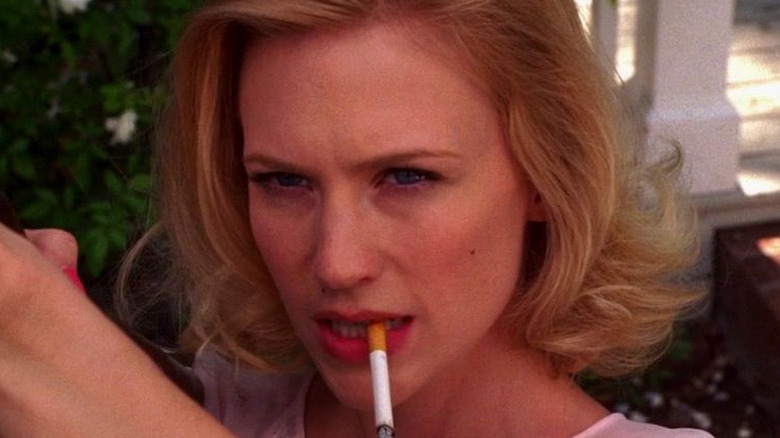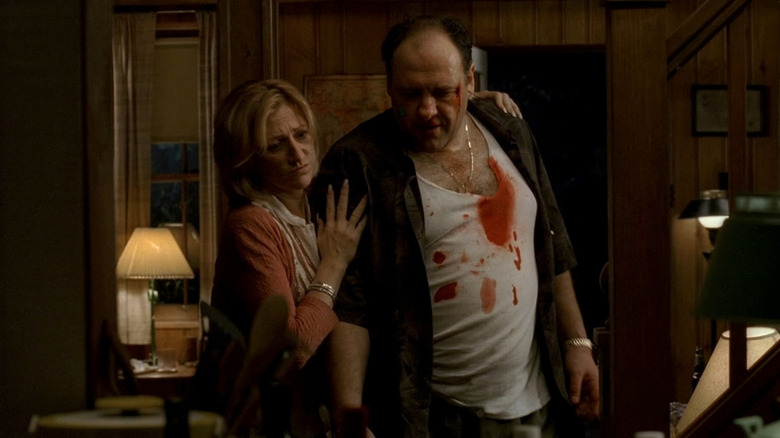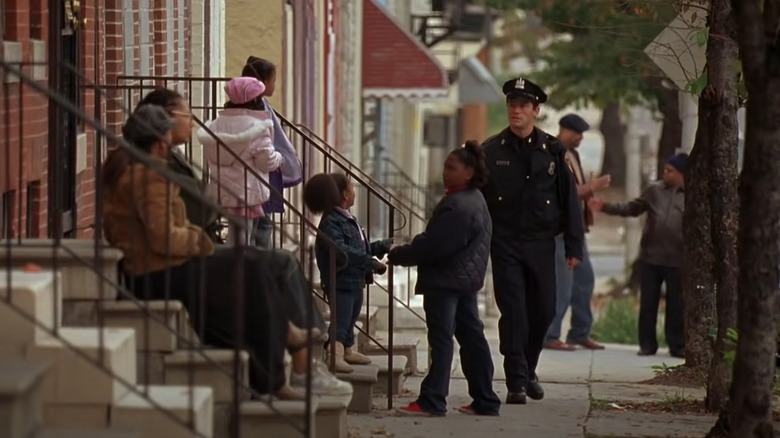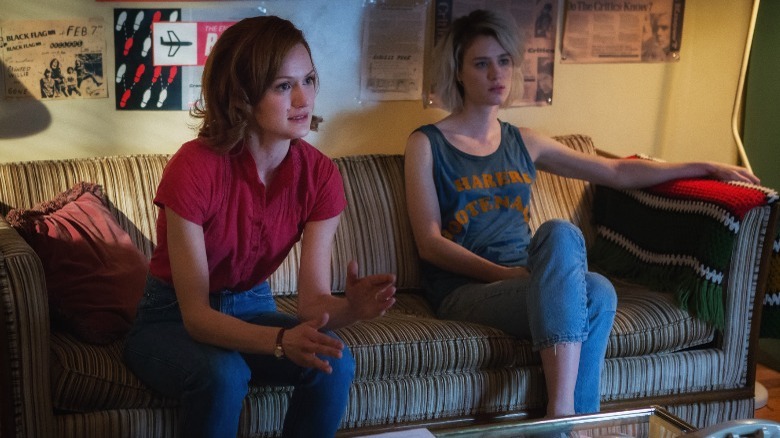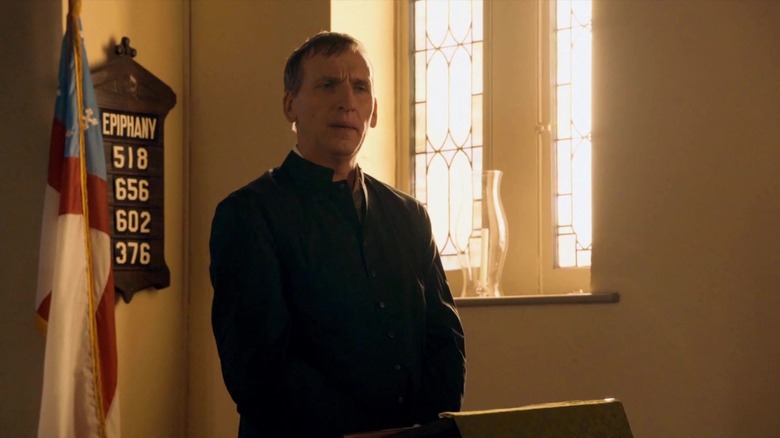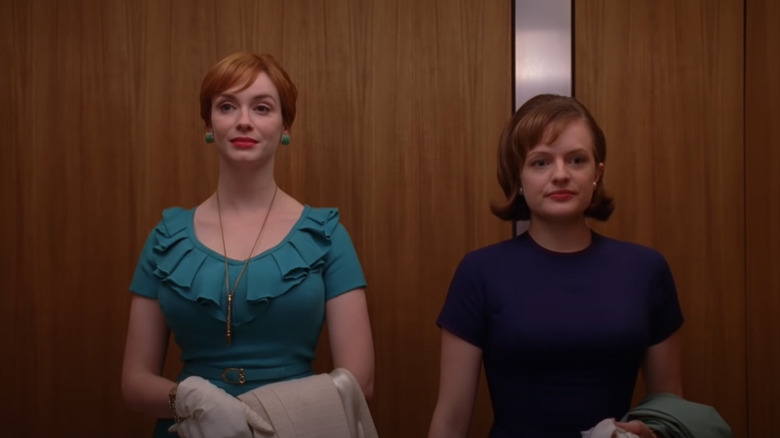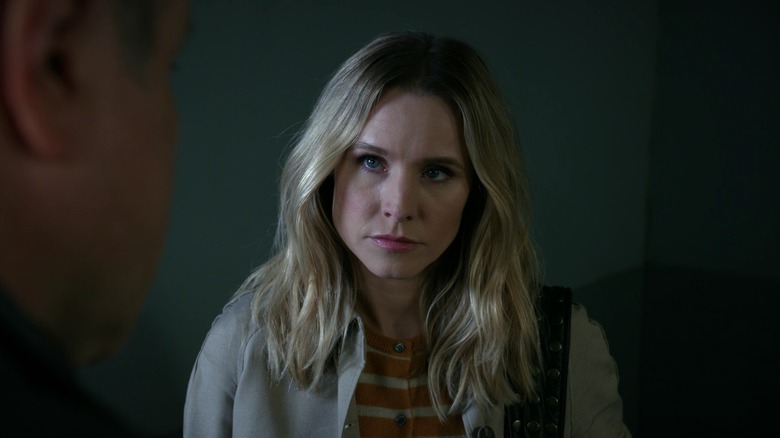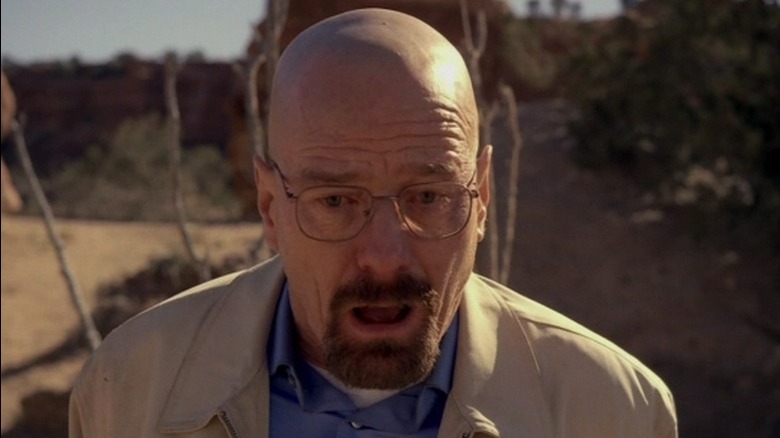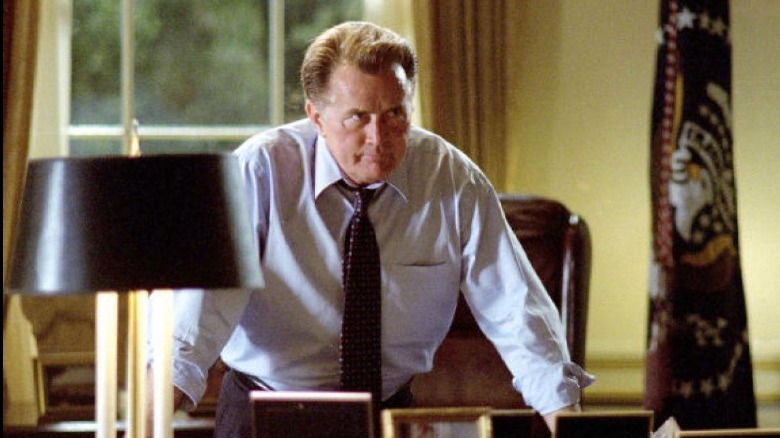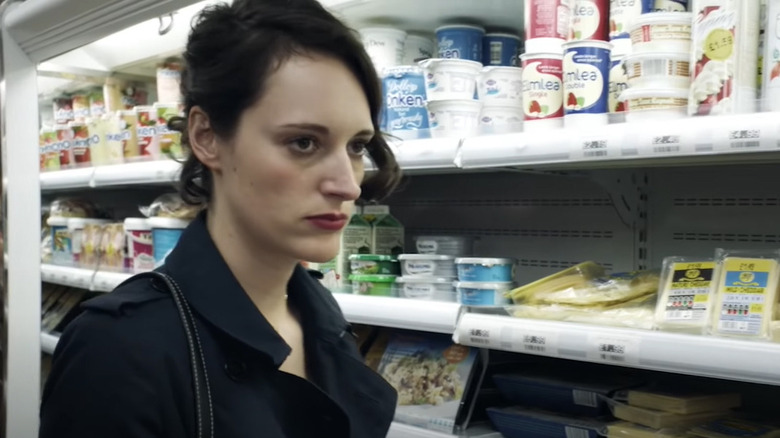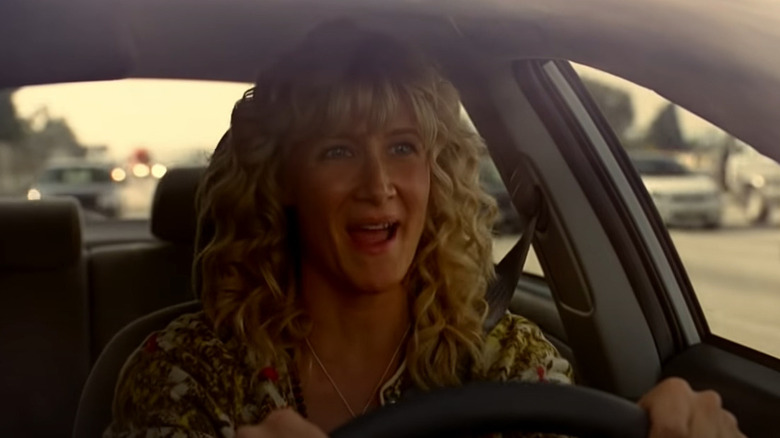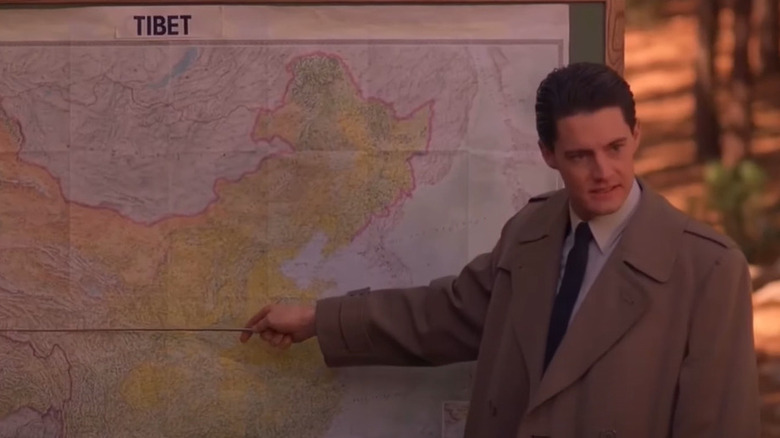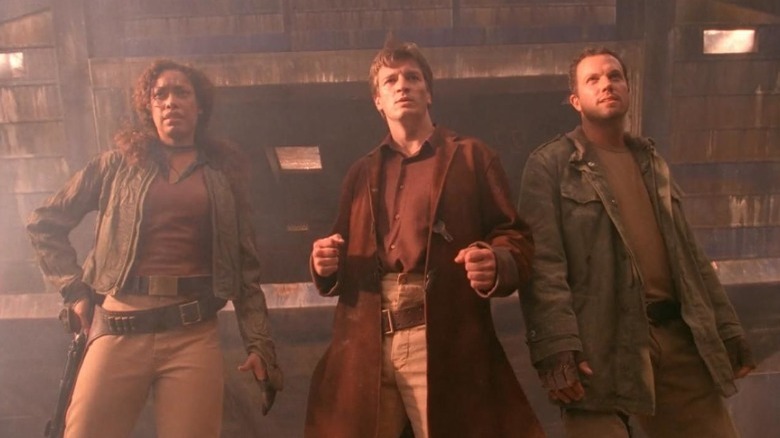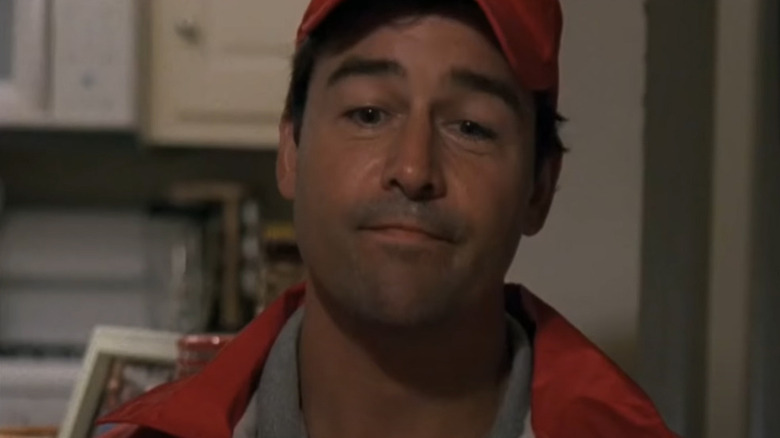Most Bingeworthy Dramas Of All Time
What makes a show bingeworthy? As we move further away from the days of appointment viewing, that question becomes more and more important. In this new golden age of TV, viewers of all stripes are being provided with all-time-great dramatic series. But while some new shows spread like wildfire when they drop all at once, others fail to catch on. What specific elements keep us up too late, watching one episode after another?
A certain amount of plot per episode keeps us hitting the "still watching" button, for starters. Compelling characters are also a must. Be they heroes, anti-heroes, villains, or something else entirely, they need to grow and change in a way that keeps us interested. In the era before binge-watching, it used to take an entire fall, winter, and even spring to watch a single season of something. But with dedication and a decent couch, modern viewers can take in that amount of content in a few days. As a result, we now create deep bonds with thorny, complex fictional figures in the span of a single week (or even day), rather than maintaining casual, weekly relationships with them, constrained by older TV conventions.
The dramas that work best in this new era have to be dense, attention-grabbing, and subtle, all at once. Which shows manage to keep all these balls in the air? We're glad you asked. These are the most bingeworthy dramas of all time.
The Sopranos
Someday, when they're charting the history of the televisual medium, they'll mark things as "BTS" or "ATS" — as in, "before" or "after 'The Sopranos.'" The celebrated crime drama premiered on HBO in 1999 and went on to change the way we think about television forever. From the series' opening scene, in which high-powered mobster Tony Soprano waits in his therapist's office, to its ambiguous, polarizing ending, "The Sopranos" re-imagined the rules of dramatic television. Its blend of existentialism, humor, brutal violence, and pitch-perfect soundtrack choices reigned supreme for the better part of a decade.
Arguably, "The Sopranos" was also the first show that people binged, as we now think of it. Anyone old enough to remember the 2000s probably has a story about waiting for the next bunch of "Sopranos" DVDs to be returned to Blockbuster, or to arrive in the mail from Netflix. Along the way, TV's most addictive show redefined HBO as a destination for prestige drama, ushered in a new era of TV anti-heroes, and joined the ranks of "The Godfather" and "Goodfellas" as an all-time great mobster story.
The Wire
The five seasons of "The Wire" comprise a feat of storytelling that has yet to be matched. Although certain characters recur throughout the entire series (like the inimitable Michael K. Williams as Omar Little), the real star of the show is its home city of Baltimore, Maryland. Unlike countless movies and TV shows that have a pat, tourist-y reverence for their setting (typically New York City), "The Wire" sets out to illuminate Baltimore and its institutions in all their flawed complexity by shifting the show's focus each season. Respectively, the series' five seasons focus on the city's drug trade, ports, politics, education system, and press.
As a result, "The Wire" has a dense, almost novel-like feel. Admittedly, the show's first shift of focus between Seasons 1 and 2, which abruptly moves from dramatic drug intrigue to a bunch of stevedores who seem entirely unrelated, throws many people off during their first-time binge. It does take some getting used to, but the show gets better at these transitions. As a whole, "The Wire" is unlike any other show ever made. Its sense of time, place, and scale come together with a level of skill and insight that remains unparalleled.
Halt and Catch Fire
"Halt and Catch Fire" is a show about how we got to our current point of perma-connectivity. For every Steve Jobs and Mark Zuckerberg out there, there are dozens and dozens of dreamers, tinkerers, and builders you've never heard of, who came darn close to becoming household names. "Halt and Catch Fire" takes a look at four such characters as they follow the pull of cutting-edge technology and fresh ideas. It begins during the personal computing boom in the early '80s, continues into the infancy of online gaming, and eventually lands in the age of the early internet and its first search engines, covering more than a decade of time in total.
"Halt and Catch Fire" is an ode to starting over. Much like the main characters, who are constantly forced to retool their approach, co-creators Christopher Cantwell and Christopher C. Rogers pivot the show nearly every season to tell the story the way it needs to be told. A so-so Season 1 gives way to something entirely different in Season 2. The stakes proceed to blow up and reset through all four seasons of the show. The end result is something that feels lived-in and bears the weight of time: Watching "Halt and Catch Fire" is a little like looking at Facebook's "on this day" notifications and being mystified that so many years have gone by — and that the website was keeping track.
The Leftovers
"The Leftovers" is a show about aftermath. Three years after the mysterious "Sudden Departure," which saw 2% of the world's population suddenly vanish, no one in "The Leftovers" has any concrete idea why it happened, or if it will happen again. What results is a moving exploration of the different ways people reckon with loss, terror, and awe.
After the dour Season 1 was received with middling reviews, the location of the show was changed, the tone was lightened, and the theme song was replaced. As a result, Seasons 2 and 3 of "The Leftovers" are some of the best television ever made. Redeeming himself for the controversial ending of "Lost," showrunner Damon Lindelof employed restraint in approaching the show's central mystery. "The Leftovers" focuses on dream-like storytelling and long-term character development over puzzle box shenanigans — viewers come for the mystery, but they stay for Carrie Coon's incredible lead performance and the running subplot regarding the cast of "Perfect Strangers."
Mad Men
The show that launched AMC into the prestige drama big-time, "Mad Men" is an exercise in time travel. Not only does the show transport viewers effortlessly to the early '60s, which it brings to life via stunningly detailed décor and costumes, binging it will take you all the way to the year 1970. The scope and breadth of the characters' lives is so finely crafted, you feel as though you live those years right alongside them.
Through the cynical but pragmatic lens of advertising, "Mad Men" examines the promises and ideals of the '60s, as well as the harsh realities of what life was actually like back then. It functions as an addictive drama, a history lesson, a work of media criticism, and an exploration of how even the best virtues of humanity can be commodified to sell Coca-Cola. It stands as a towering achievement of American storytelling, right beside anything by Steinbeck or Updike — plus, "Mad Men" has the added benefit of a killer theme song.
Veronica Mars
If you're looking for a juicy mystery, "Veronica Mars" is the perfect binge-watch to satisfy that itch. Moreover, the role of the titular teen private eye launched Kristen Bell to stardom, which makes it a fascinating artifact of recent Hollywood history. A show that perfectly balances its mysteries-of-the-week alongside larger, season-long sagas, "Veronica Mars" became a cult hit that survived for three years on UPN (which was succeeded by The CW) despite low ratings.
If anything measures potential bingeworthiness, it's the amount of passion fans have for the show in question. "Veronica Mars" might have the most demonstrably passionate fanbase on record. In 2013, six years after the show was canceled, creator Rob Thomas launched a Kickstarter to raise $2 million for a "Veronica Mars" movie. Not only was that goal met within hours, it ended up raising over $5.7 million total. Eventually, Hulu got in on the action, releasing Season 4 in 2019. Though "Veronica Mars" ends, as ever, with more mysteries to solve, it covers so much in-universe time that it can't help but be an extremely satisfying binge.
Breaking Bad
If "The Sopranos" is the show that ushered us into our present golden age of television, then "Breaking Bad" marks the beginning of the binge-by-streaming era. Just when the TV-viewing public became able to consume vast quantities of content via Netflix, Hulu, and other platforms, "Breaking Bad' came along with a killer premise, a dense and propulsive plot, and Bryan Cranston's show-stopping performance as Walter White. It proceeded to keep us all up until the wee hours, just to see what happened next. If you somehow missed that moment, were too young for the show at the time, or just haven't gotten around to watching "Breaking Bad," you're in for the ride of your life.
An impeccably made masterpiece, "Breaking Bad" is a particularly ideal show to binge-watch: Each episode has its own unique rhythm, which builds to a larger story. The series' inventive camera angles, beautiful shots of the Albuquerque landscape, and slow-burn story arcs give it a dream-like quality that strays into nightmare just often enough to keep you awake.
The West Wing
Politics isn't always terribly inspiring — in fact, it can be downright demoralizing. "The West Wing," which became a ratings giant at the turn of the century (via The Guardian), provides a welcome respite from the vitriol and misinformation of our digital age. It has the requisite stellar cast, crackling Aaron Sorkin scripts, and big-budget network drama production values, of course. But what makes "The West Wing" truly special is the way it captures a certain stateliness, earnestness, and warmth among its world-shaping characters. It's the sort of portrayal of politics you don't often see, outside of "Parks and Recreation."
If your views aren't as liberal as those of the fictional Bartlet administration, don't count "The West Wing" out. After Aaron Sorkin's famously acrimonious exit from the show (via Variety), it continued on for three more seasons, which focus more on international military strife than domestic issues. Beyond that, people across the political spectrum can take comfort (grimly ironic though it may sometimes feel) in the ideals of cooperation espoused by "The West Wing."
Fleabag
Feeling low? Nothing alleviates loneliness better than making contact with the brilliant mind of Phoebe Waller-Bridge. Fortunately, those of us who are not her close personal friends or able to see her perform live can stream both incredible seasons of "Fleabag" at will. By turns uproarious, solemn, intimate, and surprisingly religious, "Fleabag" began as Waller-Bridge's one-woman show. This origin remains apparent in the titular character's tendency to talk to the camera, which takes the show to emotional depths the Ferris Buellers of the world can only dream of.
What at first seems like a device for comedic effect, a la Jim mugging for the camera on "The Office," becomes a key piece of the story itself. In addressing the audience, "Fleabag" becomes a subtle and deep rumination on the stories we tell ourselves to get by, and the people we pretend to be for anyone paying attention. "Fleabag" will break your heart in a way that makes you happy to be alive.
Enlightened
If you enjoyed "The White Lotus," you should run, not walk, to checking out creator Mike White's previous show, "Enlightened." A stunning showcase for the tremendously talented Laura Dern, "Enlightened" is about Amy Jellicoe, a woman who has a breakdown, finds a semblance of inner peace on a healing retreat in Hawaii, then has trouble returning to the world she knew, with its sharp edges and egoic pitfalls. If "The White Lotus" is about how you bring the world's flaws with you to paradise, "Enlightened" is about how paradise is nearly impossible to bring back home with you.
"Enlightened" is also an eternally timely show. As Amy attempts to balance mindfulness with the cynical realities of American society, she runs into conflicts that extend far beyond the recent mania for "wellness." Amy is a stand-in for all of us as we try to be "good people," despite the fact that we rarely have the foggiest idea of what the right thing to do even is.
Twin Peaks
Whether you've drifted off on the couch or brought a laptop to bed, we've all fallen asleep while streaming at some point. If you're going to watch something on the verge of dreaming, why not go with "Twin Peaks," the most dream-like show ever made? Taken together, the three seasons (and prequel movie) that comprise "Twin Peaks" stand as one of the most bizarre achievements in long-form storytelling around. Normally, David Lynch only has two hours to confound your sense of reality, as he does in movies like "Mulholland Drive" and "Lost Highway." But "Twin Peaks" offers 48 episodes, which defy anyone's ability to predict what will happen next, or even fully understand what's happening in the moment.
That being said, "Twin Peaks" is compelling in its earliest episodes because of its indelible sense of place and quotidian specificity. It starts, as many shows do, with a normal murder-mystery hook, then slowly but surely starts to chip away at the ground beneath everyone's feet. There's no other binge-watch like it, in every sense.
Firefly
Pity the previous generations who never knew the feeling of watching an entire TV show in a single day. At just under 12 hours in total, including the sequel film "Serenity," Joss Whedon's "Firefly" is a show so brief and engaging, it's impossible to imagine only watching one episode and calling it a day. Though "Firefly" was famously mishandled by Fox, banished to Friday nights, and ultimately canceled, it earned such a passionate fanbase that "Serenity" was greenlit in 2005. That's well before social media was widespread enough to amplify fan outrage the way it does know, and a long ways away from our modern era of crowdfunding.
Set in a distant future following a failed galactic revolution, "Firefly" is a futuristic space opera and a throwback Western. Sci-fi speculation and dusty pioneers are both on deck here, as are larger themes of family, power, and loss. It all centers around an outlaw ship of misfits you'll love by the end of your binge-watch. Then, like so many "Firefly" fans before you, you'll find yourself reluctant to say goodbye. Your acquaintance with Mal, Zoe, and the rest of their crewmates might be brief, but it's definitely potent.
Friday Night Lights
Sure, the football scenes are exciting. Yes, the extended cast is superb, no matter what changes it undergoes. But the thing that truly elevates "Friday Night Lights" into the pantheon of all-time-great bingeworthiness is that it starts and ends with Mr. and Mrs. Taylor, the most realistically healthy marriage in television history. Watch in awe as they are able to be angry at one another without being abusive or histrionic! Marvel as they take turns compromising by putting each other's needs before their own! Be moved to tears as they comfort one another in the hardest of times! Laugh as they needle one another relentlessly, the way only those who have been married for a while can do! Forget sports — this is where the action is.
Brought to life by the excellent Kyle Chandler and Connie Britton, the Taylors are the centerpiece of a show so beloved, it was saved from early cancelation, despite low ratings. With the exception of a regrettable "sweeps week" sub-plot in Season 2 involving a self-defense killing, the Taylors and the young adults they mentor deal with relatable problems in ways that feel true to life, and true to the show's Texas setting. If you need to watch something uplifting, turn to the show that coined that phrase, "Clear eyes, full hearts, can't lose."
